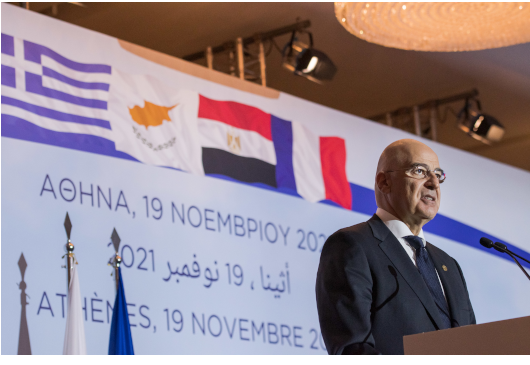 Cher Jean-Yves,
Cher Jean-Yves,
Eazizi Sameh,
Dear Nikos,
It is my great pleasure to host you in Athens today, two years after our last meeting in Cairo in January 2020 and following our online meeting in May 2020, in which our friend and counterpart from the United Arab Emirates, Sheikh Abdullah, participated.
During our long discussions today we examined the common challenges, but also our common opportunities in the wider region, in the Eastern Mediterranean, in the Middle East, in the Sahel region.
We examined the deepening of our already important cooperation in strategic areas, in energy, the economy, tourism, interconnectivity, which is necessary for the advancement of the economy and prosperity.
We believe that solidarity between the countries of the region is necessary to address challenges and to create the prosperity and stability to which we aspire.
I would like to express Greece's gratitude to you once again, as all the countries present supported us during the crisis of last summer; and, of course, from our part, to declare that we stand in solidarity with France, Egypt and Cyprus.
We also discussed issues such as the spread of terrorism in Africa, migration, as well as access to essential goods, such as the Nile water resources, which is of particular concern to Egypt.
Ladies and gentlemen, the strategic relationship between our four countries is based on the solid foundation of our common principles, such as respect for International Law, the Law of the Sea, the peaceful settlement of disputes and prohibition of the threat to use violence, as is explicitly stated in the United Nations Charter.
And, of course, the respect we all demonstrate for the sovereignty and sovereign rights of all states.
These Principles are reflected in the Joint Statements that we have adopted from January 2020 until today.
It is unfortunate that, although almost 24 months have passed since then, the issues that concern us remain relevant today.
In other words, the challenges we face in the Aegean, the Eastern Mediterranean, Libya are the same. And the common denominator of most of them remains neighbouring Turkey.
Turkey continues to threaten Greece with war, it continues to violate our sovereignty and sovereign rights, it continues to illegally occupy territory of the Republic of Cyprus, it continues to violate its maritime zones, it continues to shelter the Muslim Brotherhood.
Turkey has provided the example of the instrumentalization of the migrant issue, which is presently finding imitators in Belarus.
And, of course, Turkey maintains military forces and mercenaries in Libya and insists on the non-existent and illegal Turkish-Libyan memorandum.
However, I want to be clear. Today’s meeting is not a meeting against Turkey.
We, all countries, seek good relations and a constructive dialogue with Turkey, but, of course, always in the framework of International Law and the International Law of the Sea.
Our shared vision is to consolidate peace, security and prosperity in our wider region.
And we hope that Turkey will at some point endorse the concept of these Principles of International Law, including the United Nations Charter and the UN Convention on the Law of the Sea, something that will break new ground in our relations.
Of course, this seems like a distant dream today.
The threat of war, the occupation of other countries' territories, the export of mercenaries, the export of drones, human rights violations and the imprisonment of journalists are still here.
However, as regards our meeting, I have to say that it proves the existence of the enormous potential that characterizes relations between our countries; a potential that may - in view of the significant opportunity provided by the French Presidency of the European Union, starting from January 1, 2022 – establish a different reality in the region by precisely serving the principles of stability, peace and prosperity of the peoples.
I warmly thank you from the bottom of my heart for your presence in Athens today.
I look forward to our next meeting.
November 19, 2021


